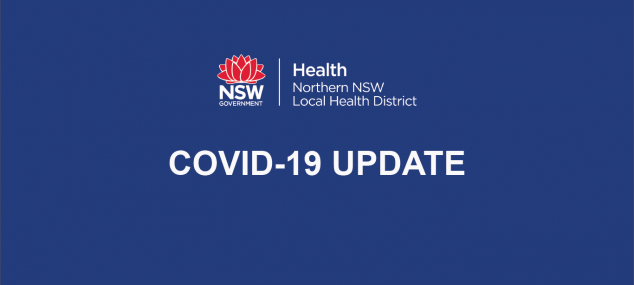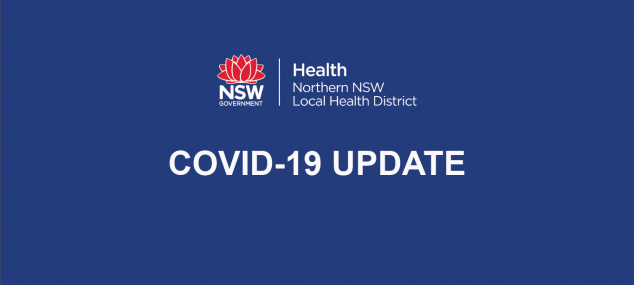Monthly Archives: December 2020
Published
2020/12/30 at 12:00 pm
COVID-19 Update: 30 December 2020

There have been no new confirmed cases of locally acquired COVID-19 reported in Northern NSW Local Health District residents since 25 July, 158 days ago.
One new case has been recorded in a Tweed Shire resident on 26 December who acquired their infection overseas. This person is currently in hotel quarantine in Sydney, and will be released from isolation once health staff confirm that it is safe to do so.
“While testing rates have dropped in the last day or two in line with the NSW trend, we were pleased to see high numbers of people coming through our testing clinics over the Christmas period, with around 2,600 tests conducted in the past week,” Wayne Jones, Chief Executive Northern NSW Local Health District, said.
“We have now reached more than 90,000 tests conducted across the District, an outstanding milestone.”
Anyone with even the mildest symptoms, such as headache, fatigue, cough, sore throat or runny nose, is asked to come forward immediately for testing, then isolate until they receive a negative result.
NNSWLHD cases by likely source of infection:
SourceTotal
Overseas or interstate acquired58
Locally acquired – contact of a confirmed case or in a known cluster4
Locally acquired – source not identified1
Under investigation0
Total63
To help stop the spread of COVID-19:
- If you are unwell, get tested and isolate right away – don’t delay. Remain isolated until you receive your test result.
- Wash your hands regularly. Take hand sanitiser with you when you go out.
- Keep your distance. Leave 1.5 metres between yourself and others.
- Wear a mask when using public transport, rideshares and taxis, and in shops, places of worship and other places where you can’t physically distance. When taking taxis or rideshares, commuters should sit in the back.
To find your nearest testing clinic visit https://www.nsw.gov.au/covid-19/how-to-protect-yourself-and-others/clinics or contact your GP.
Published
2020/12/22 at 8:27 am
NEW RESTRICTIONS AT NORTHERN NSW HOSPITALS

From today, visitors from certain NSW Local Government Areas (LGAs) will not be able to enter hospitals and health facilities in Northern NSW Local Health District.
At present, the affected areas are the Greater Sydney area and the Central Coast LGA, Wollongong LGA, and Blue Mountains LGA.
Visiting Hours and numbers are again being reduced to one visitor for one hour, once a day between the hours of 1pm – 6pm. There are no changes to maternity services at this stage.
Additional restrictions also apply to residential aged care facilities located at the four Multi-Purpose Services in Nimbin, Kyogle, Urbenville and Bonalbo.
No visitors will be allowed at these facilities, unless there are exceptional circumstances such as for palliative care.
“These are difficult, but necessary decisions that we are taking for the safety of our patients and our health facilities,” Northern NSW Local Health District Chief Executive Wayne Jones, said.
“We are in contact with the families and loved ones of residents in our facilities and will continue to monitor the situation closely in the lead up to Christmas.”
To further reduce risk in all health settings, all health workers in hospitals and community health settings should wear a mask if within 1.5 metres of patients, and patients are also required to wear a mask where possible.
Visitors will continue to be required to wear masks, and health screening is still in place at all NNSWLHD facilities, as part of the measures to reduce any risk of transmission and keep patients safe.
Anyone entering a facility will have their temperature checked and be asked a series of questions to determine they are well and have not visited any COVID hotspots in the past 14 days.
There are more than 300 COVID-19 testing locations across NSW. To find your nearest clinic visit https://www.nsw.gov.au/covid-19/how-to-protect-yourself-and-others/clinics or contact your GP.
Published
2020/12/21 at 6:08 pm
COVID-19 Update 21 December 2020

Residents and visitors to Northern NSW are being urged to take strict COVID-safe precautions and keep up to date with the changing public health directions in response to the current outbreak.
Anyone in NSW with even the mildest symptoms, such as headache, fatigue, cough, sore throat or runny nose, is asked to come forward immediately for testing, then isolate until they receive a negative result.
For anyone visiting our region, don’t skip getting tested for COVID-19 this festive season, just because you may be away from home. If you feel unwell, get tested immediately,” Wayne Jones, Chief Executive Northern NSW Local Health District, said.
Our health services are continuing to monitor the situation, and are involved in daily planning discussions around staffing levels over the Christmas period. This also includes staffing requirements to screen incoming travellers at the Ballina Byron Gateway Airport, which has started today.
Testing rates
Across the Northern NSW Local Health District we have seen a sharp rise in the number of people coming forward for testing over the last week, and in particular this weekend.
Over the last four days our hospital testing clinics conducted 1348 tests, on top of more than 1,100 tests done across the District in the week prior, ending 16 December.
‘Almost 50 percent of the people presenting for testing in recent days in our hospital clinics have been residents from the Northern Beaches in Sydney, with the majority of these coming through our Lismore and Byron Bay testing clinics,” Mr Jones said.
Coming forward for testing is a key method for us continue to monitor and reduce the likelihood of spreading the disease in the community.
Thank you to everyone, both residents and visitors, who has come forward for testing so far. Since the pandemic began, there have been more than 87,000 tests done across the District.
Public Health Orders for Northern Beaches residents
Under the current ‘Stay at Home’ orders in place, issued on Saturday 19 December for residents of the Northern Beaches LGA, residents are required to stay at home, unless permitted to leave for certain reasons.
These restrictions also apply to any residents of the Northern Beaches LGA who left the area on or since Thursday 10 December 2020 and may be in the Northern NSW region or other areas of NSW.
Acceptable reasons for leaving home include shopping for food and other essential goods and services; travelling to work or an educational institution if working or studying from home is not possible; exercising; seeking medical care; providing carer’s responsibilities and meeting compassionate needs. It is strongly recommended masks are worn when leaving isolation for these permitted reasons.
The health orders are available on the NSW Government website.
Local case numbers
There have been no new confirmed cases of locally acquired COVID-19 reported in Northern NSW Local Health District residents since 25 July, 150 days ago. Of the 62 cases recorded among residents, 58 are considered to have recovered.
NNSWLHD cases by likely source of infection:
| Source | Total |
| Overseas or interstate acquired | 57 |
| Locally acquired – contact of a confirmed case or in a known cluster | 4 |
| Locally acquired – source not identified | 1 |
| Under investigation | 0 |
| TOTAL | 62 |
To help stop the spread of COVID-19:
- If you are unwell, get tested and isolate right away – don’t delay. Remain isolated until you receive your test result.
- Wash your hands regularly. Take hand sanitiser with you when you go out.
- Keep your distance. Leave 1.5 metres between yourself and others.
- Wear a mask when using public transport, rideshares and taxis, and in shops, places of worship and other places where you can’t physically distance. When taking taxis or rideshares, commuters should sit in the back.
To find your nearest testing clinic visit https://www.nsw.gov.au/covid-19/how-to-protect-yourself-and-others/clinics or contact your GP.
Published
2020/12/17 at 1:46 pm
Health advice: avoid contaminated floodwater

The North Coast Public Health Unit is urging residents and visitors to keep away from floodwater to avoid illness or infection.
Director Public Health Paul Corben said it is important that people treat all floodwater as potentially contaminated.
“People should not swim or play in floodwater because diluted sewage, bacteria, chemicals and physical hazards may be present,” Mr Corben said.
“Swimming in contaminated water may cause illness, including ear infections, eye infections, fever and diarrhoea,” Mr Corben said.
“While the risk of infection is generally low, it’s important to stay away from flood-affected areas and avoid unnecessary contact with mud and floodwaters.”
Residents and visitors are advised to avoid swimming in the ocean, rivers, creeks and lagoons during a flood event, and for at least three days after the rain has stopped. Residents should also avoid swimming if there are signs of pollution such as discoloured water, oil or scum on the water, and litter or other debris floating in the water or on the tide line.
If participating in flood clean-up activities, people should:
- ensure that feet are covered and always wear gloves
- always wash hands thoroughly with soap or alcohol-based hand cleanser.
- cover cuts and abrasions; and
- if you cut yourself on something that has been contaminated with floodwater, check with your GP about your tetanus vaccination.
“To avoid illness, it is important to wash hands with soap and clean water after participating in any flood clean-up activities, and before eating or handling food,” Mr Corben said.
Hints for staying healthy during floods and while cleaning up:
- Wear gloves and suitable footwear when removing mud or debris from homes or yards.
- Yards can be raked to remove debris and if necessary, hosed down.
- Don’t try to check electrical appliances and other equipment yourself, seek professional help.
- Discard any tinned food that has no labels, as well as perishable food that has been out of refrigeration for more than 4hours. If freezer door is kept shut, frozen food will not spoil for at least 24 hours.
- Have septic tanks or pipes professionally inspected or serviced if you suspect damage.
- Avoid being bitten by mosquitoes, cover up with light-coloured clothing, use roll-on insect repellent on exposed skin and apply every few hours.
- To avoid creating mosquito breeding sites in your yard by emptying out pot plant bases and removing all water-holding rubbish.
- When cleaning up, consider your personal health, drink plenty of clear fluids, do not wait until you are thirsty. Take breaks when you can, watch out for heat stress.
For more information on keeping healthy during and after floods or storms, see:
https://www.health.nsw.gov.au/emergency_preparedness/weather/Pages/storms-and-floods.aspx